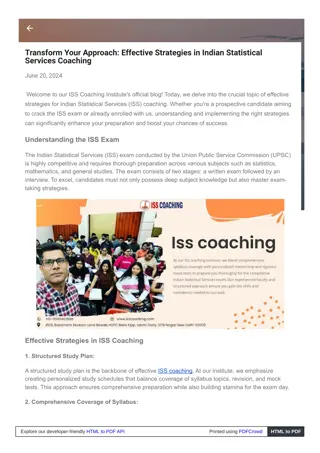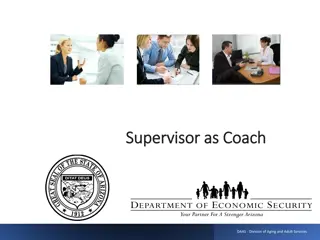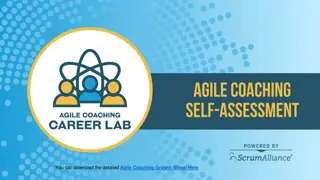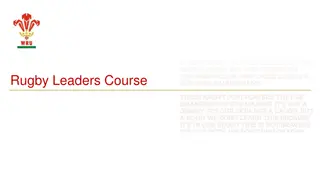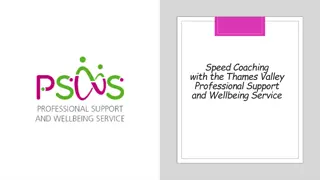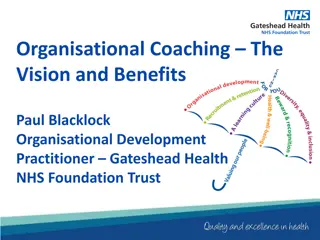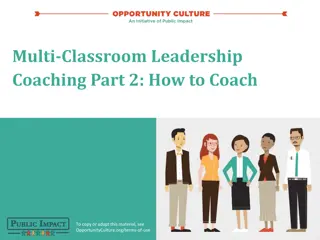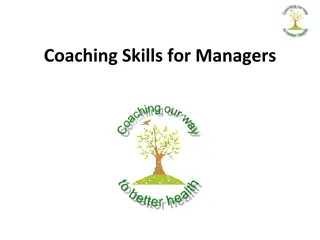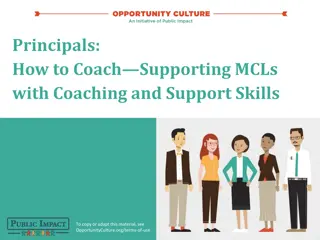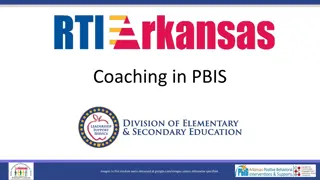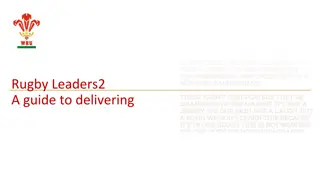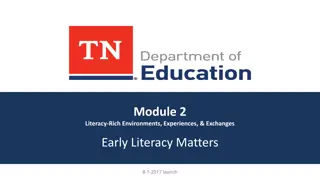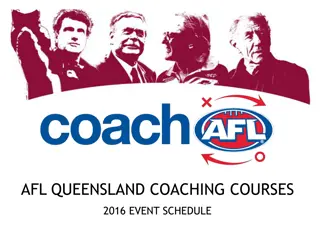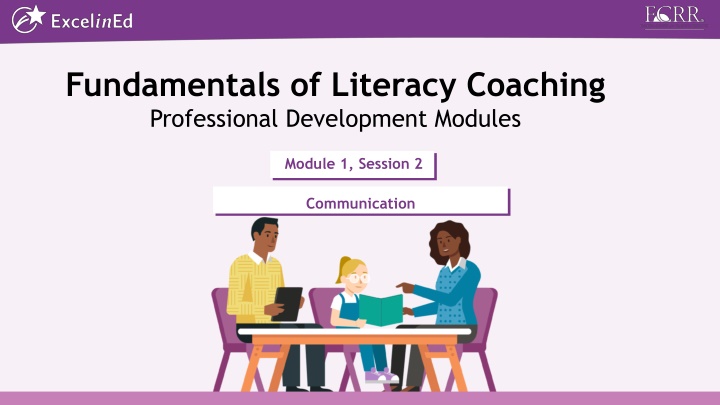
Effective Communication Strategies in Literacy Coaching
Explore the importance of positive communication in literacy coaching, learn strategies for clear and productive interactions, and engage in practical activities to enhance coaching skills. This professional development module focuses on fostering a supportive coaching culture to elevate literacy instruction outcomes.
Download Presentation

Please find below an Image/Link to download the presentation.
The content on the website is provided AS IS for your information and personal use only. It may not be sold, licensed, or shared on other websites without obtaining consent from the author. If you encounter any issues during the download, it is possible that the publisher has removed the file from their server.
You are allowed to download the files provided on this website for personal or commercial use, subject to the condition that they are used lawfully. All files are the property of their respective owners.
The content on the website is provided AS IS for your information and personal use only. It may not be sold, licensed, or shared on other websites without obtaining consent from the author.
E N D
Presentation Transcript
Fundamentals of Literacy Coaching Professional Development Modules Module 1, Session 2 Communication
Topic Session Intro 1 2 Minutes 60 120 150 Session Date Module 1 Applying Principles and Practices that Foster a Positive Culture 3 4 5 6 7 150 120 120 165 150 2 Applying Effective Pedagogy and Andragogy 3 Collecting Data to Inform Professional Learning 8 9 10 11 12 13 140 170 175 135 165 130 4 Planning, Implementing, and Analyzing Literacy Instruction 14 15 16 120 120 120 5 Growing Professionally 6 Planning and Implementing Coaching 2
Bridge to Practice Projects for Coaches An activity designed to serve as a Bridge to Practice after each Module will provide evidence that coaches are able to apply the knowledge and skills they developed in this course in their schools. Coaches will complete the following activities: Module 1 Develop a principal-coach partnership agreement. Module 2 Develop a needs assessment for professional development on evidence-based instructional practices and complete an ADDIE model for planning this professional development. Module 3 Develop and describe planned implementation of a professional learning action plan. Module 4 Create a video that reflects coaching to help teachers plan, implement, and analyze standards- based literacy instruction. Module 5 Complete a reflection on the course, including plans for continued professional growth. Module 6 Choose one teacher with whom you have seen significant growth as a result of coaching support and complete a reflection on what worked, why it worked and which areas of growth were most evident. A rubric is provided at the end of each Module for the corresponding Bridge to Practice project. 3
Norms for Our Course Pay attention to self and others Presume Cell phones on silent positive intentions 4
Define and Discuss Session Goals and Content Goals for Today Review Session 1 and debrief the self-study activities completed after the session. Learn about the importance of communication in the coaching process and how to ensure that communication is positive, clear, and productive. Examine communication in one-on-one and group settings. Preview the self-study activities to be completed before Session 3. 5
Debrief Review of Module 1, Session 1 Self-Study 1: Steps to Building a Teacher-Coach Relationship What are important aspects of relationship building as a coach and ways to develop positive relationships with administrators, teachers, and other staff? Any comments or questions about Session 1? Self-Study 2: Video Viewing Guide for Reflective Coaching Conversation Share responses to questions. 6
Define and Discuss Session Goals and Content Literacy Coach Domain and Standards: Session 2 A. Knowledge of and ability to apply principles and practices that foster an inclusive and collaborative culture. Coaches will be able to: Standard 4: Identify and apply appropriate practices to communicate across lines of difference. Standard 5: Determine and use appropriate strategies for facilitating dialogue that ensures equitable participation in small and large group settings. 7
Learn and Confirm Communicating with Teachers Some factors that may influence discourse: Purpose Preconceptions Perspective Positioning 8
Communicating with Teachers Purpose of the Conversation: Establishing or maintaining a relationship Knowledge-building Planning Reflecting and providing feedback 9
Communicating with Teachers Personal interactions with teachers are at the heart of the coaching initiative. Hargreaves wrote about the possibility of transforming people through the meanings and language of human interaction (1995, p. 11). The relationships that coaches build allow them to interact with teachers about the very important work of school improvement. In the case of these three coaches, these interactions were in fact fundamental to their everyday practice. 10 Hargreaves, 1995, p. 11; Lowenhaupt, McKinney, & Reeves, 2013, p. 749
Communicating with Teachers If there s no goal, it s just a nice conversation. I heard this saying from coaching expert John Campbell (who attributes it to coaching researcher Tony Grant). Effective instructional coaching is a goal-directed action. Goals give direction to coaching; they provide a finish line, and when they matter to teachers, goals propel the entire coaching process. If teachers don t have a goal, or if they are pursuing a goal they don t care about, the entire coaching process can be a waste of time. But when teachers pursue a powerful, student-focused goal that truly matters to them, unmistakable improvements happen in students lives and learning. 11 Knight, 2021
Communicating with Teachers Use of relevant, reliable, and valid data to analyze, evaluate, and inform next steps and action planning (including goal setting, identifying progress monitoring or outcome data needed, and development of an action plan). Decision making is an iterative process with on-going data feeding into subsequent actions. 12 Cusmano & Preston, 2018, p. 6
Communicating with Teachers Possible Preconceptions: The coach is evaluating my performance. The coach is working with me because I am not a good teacher. The coach will report my deficiencies to administration. 13
Communicating with Teachers And when coaches focus their discussions on how to address the needs of students rather than on the strengths or weaknesses of a teacher s instruction (McCombs & Marsh, 2009) they clearly communicate their intention to be a collaborator with the teacher, not an evaluator (Casey, 2006; Toll, 2005). 14 L Allier, Elish-Piper, Bean, 2010, p. 547
Communicating with Teachers As coaches engage in activities such as making classroom observations and conferencing with teachers about those observations, they must maintain confidentiality by not discussing those activities with other teachers or the principal (Rainville & Jones, 2008). 15 L Allier, Elish-Piper, Bean, 2010, p. 547
Communicating with Teachers Perspective: I am a good teacher, so I don t need a coach. I know more than my coach does. I do not need to change my practice. My philosophy for teaching reading is not the same as the coach. 16
Communicating with Teachers The experience of teacher wariness to allow coaches and other professionals into the classroom is a common experience cited in the literature (e.g., Ancess, Barnett, & Allen, 2007; Sarason, 1996) and can be seen as a normal reaction that people have toward attempts at behavior change (Miller & Rollnick, 2002). Continuous dialogue and responsiveness among the partners, working alongside practitioners to seek and craft solutions, and expressing sensitivity to teacher needs help to build trust between the coach and teachers (Ancess et al., 2007). 17 Hershfeldt, Pell, Sechrest, Pas & Bradshaw, 2012, p 9
Communicating with Teachers Prior research has highlighted some implementation challenges of coaching initiatives. Most notably, evidence suggested that instructional coaches often face resistance from the teachers with whom they work, a manifestation of what has been described as a loosely coupled and isolated culture of teaching (Bredeson 2003, Weick 1976). Some teachers also report feeling professionally threatened by their instructional coach peers, a topic discussed in recent literature with respect to notions of authority and power (Camburn et al. 2008, Lynch and Ferguson 2010, Coburn and Woulfin 2012). 18 Lowenhaupt, McKeinney, & Reeves, 2013, p. 740
Communicating with Teachers Possible Positioning: The coach is the expert. The coach has power over the teacher. The teacher has less expertise and commands less respect. 19
Communicating with Teachers Finding ways to value the knowledge and expertise that all participants bring to professional learning interactions is an important step in developing a culture of shared inquiry. As members of a community recognize, and are recognized for, the strengths they bring to the community, relationships will grow, creating solid ground for deeper inquiry into literacy practices and discourses. 20 MacPhee & Hunt, 2018, p. 14
Communicating with Teachers Through a collaborative approach, teachers are likely to feel their ideas are valued, and in turn, communication will be more effective. 21 Walkowiak, 2016, p. 16
Communicating with Teachers Read Handout 1: How Varying Perspectives Influence Discourse: A Scenario 22
Communicating with Teachers Discuss Handout 1 with a partner or in small groups: Do you think that Ms. Jensen and Ms. Thomas knew that the other was frustrated? What makes you think that? Why were they both frustrated? What could have been done to ensure that the conversation was productive? What do you think happens if the discourse continues as it is between the coach and the teacher? Whose responsibility is it to ensure that conversations are productive? 23
Enhancing Communication Between Coaches and Teachers The topic of coaching is focused on literacy instruction/practice. The coaching goal is teacher learning. Teachers should talk more than coaches during coaching conversations. 24
Communicating with Teachers Engage teachers using verbal moves to extend the conversation and encourage more teacher talk, which leads to collaborative learning. Request information. Ask for the teacher s opinion. Request clarification. 25
Communicating with Teachers Practices to avoid when having a coaching conversation: Talking too much. Interrupting the teacher. Simply acknowledging, agreeing, or showing acceptance (this tends to shut down the exchange). 26
Communicating with Teachers Read Handout 2: A Coaching Conversation Vignette regarding the experience between literacy coach, Ms. Porter, and teacher, Ms. Walters. Answer the questions about the vignette. Discuss the questions and your answers with a partner or with a small group. 27
Communicating with Teachers Handout 3: Video Viewing Guide for Video 1: Watch the video, complete the viewing guide, and discuss with a partner or in your small group. Video 1: Coaching Conversation-Reflecting on a Lesson (Grade 2) 28
Collaborate and Practice Communicating with Teachers Review Handout 4: Scenarios for Coaching Conversations to Role-Play. Role play scenarios with a partner. Debrief in whole group. 29
Learn and Confirm Facilitating Professional Learning in Groups Professional development should address needs of the school based on data. Professional development should be ongoing, and coaches should support implementation in the classroom. 30
Facilitating Professional Learning in Groups Research (e.g., case studies, interviews, observations) and scholarship on professional development practices suggest that in some cases, PLCs can foster teacher learning and improve the professional culture of a school. PLC materials have been developed to promote teacher learning on a variety of topics. Borko, 2004; Buysse, Sparkman, & Wesley, 2003; Englert & Tarrant, 1995; Little, 2002; Wilson & Berne,1999; Vescio et al., 2008 31
Facilitating Professional Learning in Groups Establish norms. Build trust within the group. Value everyone s contributions. Develop shared goals. Allow teachers to discuss in small groups before calling on them to share in a large group. Use a graphic organizer to track teacher/discourse/participation. Rasberry & Mahajan, 2008 32
Collaborate and Practice Facilitating Professional Learning in Groups Sneak Peek: Establishing Expectations and Norms Watch the Video 2: Small Group Data Discussion and Planning Debrief in whole group. 33
Facilitating Professional Learning in Groups With a partner or in your small groups, use chart paper and markers to create an infographic that reflects how to conduct a small or large group professional development where everyone participates and shares ideas. 34
Reflect, Plan, and Implement Think-Pair-Share What did you learn during this session that confirmed what you already knew about having coaching conversations and facilitating dialogue in small and large professional learning sessions? What did you learn that you need to focus on implementing as a coach? 35
Reflect, Plan, and Implement Post-Session Reflection, Planning, and Implementation Handout 5: Coaching in Context-The Role of Relationships in the Work of Three Literacy Coaches READ Complete Self-Study 1: Reflections on Session 2 and Communication. Reflect on your participation in Session 2 by noting any questions about the content or format in Self-Study 1. Bring this self-study assignment to Session 3. DO WATCH Video 3: Coaching Conversations with Diana Beabout Retrieved from: https://youtu.be/JNHKZH5ropA?si=ExUfcInYPN0_pdPu&t=23 on 1/4/2024 and Video 4: Observations and Feedback Retrieved from: https://youtu.be/bBeNs1Q2kXk?si=K3W5VBFCAyyV64T on 1/4/2024 and complete Self-Study 2:Video Viewing Guide for Video 3 and Video 4 Coaching Conversations. Be prepared to debrief at our next session. 36
Questions? 37
We have completed Session 2 38



